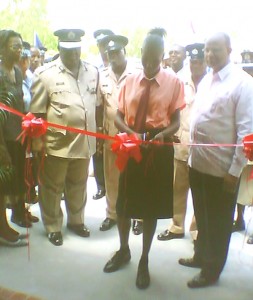Greene: ‘This will reduce the time spent on the telephone, sending messages and information. Instead we can do it through the computer… Each member of the Force will have to understand and be trained in information technology. If you are not there you need to get there’
A $17M computer training centre was yesterday handed over to the Guyana Police Force (GPF) and it is expected to ensure that ranks are fully trained to cope in the world of Information Technology and disseminate vital information faster.

The setting up of this centre, located at the Felix Austin Police College, Eve Leary, falls under the Citizens Security Programme which is funded by the Inter-American Development Bank (IDB) and the Guyana Government.
The centre represents the first phase of a plan to computerize the Force to create a network among the various divisions so that information can be distributed at a quicker pace. And evidence of this is expected to be seen by early next year.
The facility is equipped with 25 computer systems and though there is no printer or a multi-media projector, training will commence.
In urging members of the Force to educate themselves so as to cope in the computer technology age, Acting Commissioner of Police Henry Greene, said that this project is part of a larger one that “is going to move the force into the world of information technology (IT).”
He recounted that an IT centre was set up in 1988 at the Criminal Investigation Department (CID) and it remains in existence and use today.
This new facility, the commissioner noted, has computers to cater for a larger body during a training programme.
During his address to those gathered, including Minister of Home Affairs Clement Rohee, Divisional Commanders and other senior and junior police officers, Greene pointed out that a number of projects are on stream to ensure that the Force is prepared for IT.
Internet linkup
Through their own budgetary arrangement, he said, computers have already been installed at CID to link the headquarters with the branches in the other divisions though the internet.
While there are two more places left to complete the link-up, CID can transfer photos and send information through the computer at a very quick pace, rather than relying on telephones, Greene pointed out.
“Once we have the link with Essequibo and Berbice I think that will lock-in our wanted persons, other information, all of which will be done at a very fast pace,” he stressed, adding that there are several other projects on stream in which the government has budgeted for another 23 police stations to be computerized.
At the moment, he said, 12 stations in A and B Divisions are being targeted at which some adjustments will be done to accommodate an IT centre at each station, in addition to domestic violence rooms, identification rooms, and witness rooms.
Greene stressed that the Citizens Security Programme with support from the government and the IDB is a specific project which will equip the Force with computers and certain computer programmes.
It is through this that several offices, operation rooms, regional headquarters, the commanders and a few stations will be linked.
“This will reduce the time spent on the telephone, sending messages and information. Instead we can do it through the computer… Each member of the Force will have to understand and be trained in information technology.
If you are not there you need to get there, either by your own means or by means of our organized training because information technology is the way to go,” he urged.
Greene said that it is the hope and projection that by early next year, the work that is being done manually will be done through the computer.
The commissioning of the computer training centre falls under the institutional modernization/institutional strengthening of the GPF, a component of the Citizens Security Programme.
Giving an overview, project coordinator Khemraj Rai said that the programme was funded through a US$19.2 loan from the IDB with a further US$2.8M from the government. The five-year programme which commenced in January last year will conclude in December 2011.
Besides, institutional strengthening, Rai said that the programme also comprises the institutional modernizing of the Ministry of Home Affairs and a community action component which focuses on getting the community involved in crime and violence prevention.
The coordinator stressed that in 2007 the programme faced problems but things were put in place so tangible results will be obtained in the following years. The training centre, he said, is a production of this preparation.
As part of institutional modernizing of the Force, some $5M, according to Rai, had been allocated for the construction and equipping of a modern forensic lab and the construction of a new training facility at Dora.
The training centre site has already been identified and tenders for this and the lab construction have been sent out.
Construction of the Forensic Lab should commence by yearend while early next year construction should begin on the Dora facility, he pointed out.
Minister Rohee in his address also urged the members of the Force to make maximum use of the new computer training facility.





